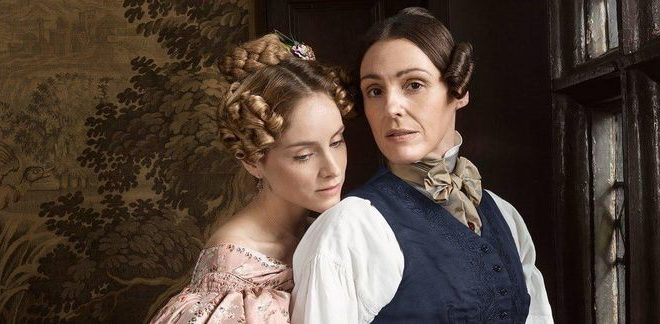
Features
Gentleman Jack: A Queer Hero Shines
By: Kelly Kearney
Now that Pride month is here, it seems only fitting to talk about HBO’s newest period drama “Gentleman Jack.” Created by famed writer Sally Wainwright and starring the spectacular Suranne Jones (“Doctor Foster”) and Sophie Rundle (“Bodyguard”) comes a story of a land-owning female industrialist who sank her teeth in the coal mining industry as well as the fairer sex. Set in Halifax in the 1830’s, Anne Lister (Jones) might be the first modern lesbian that history shoved under the rug. She documented her life in twenty-seven diaries, many of which were coded in a secret language that detailed her love affairs and, ultimately, her quest to find a wife. When it comes to this larger than life protagonist who searched for her own happiness in a time when women’s only role was to marry a man and pump out children, Anne was in a class all her own. Her story, which airs on both BBC One and HBO, has been a breath of fresh air in a long stagnant run of dramas that often find gay characters shoved to the side or, worse, killed off in the dreaded “Bury Your Gays” trope. Unlike other shows with queer characters who often take a back seat to the cis-het focused storylines, “Gentleman Jack” is unquestionably queer from the start and it might be the first show to get it right.
Unapologetically, Anne…
All too often the snarky gay best friend is where queer characters live and die. They are the sidekicks of comic relief or even killed off so the cis-het lead can grow from their tragedy. Never before have LGBTQ+ characters been allowed to wield their own destinies. They certainly aren’t the main romance fueling the story. Today’s TV buries their gays, they don’t marry them, and definitely not in primetime without mixing some straight drama into the formula. All that changed when Anne Lister met Ann Walker.
When we first meet Anne Lister she’s a fast walking, intimidating whirlwind who women are enigmatically drawn to and men fear. She’s a landowning businesswoman and a self-taught student of everything from coal mining to medicine. Incomparable in her knowledge, she is a Jack of all trades and a masculine/feminine oddity. She is also a multidimensional, fully fleshed out queer woman who can stand toe to toe with any man who dare underestimate her. Strong, yet vulnerable, she is harshly conservative both politically and socially and yet willing to vow on The Bible to a love that has no name. She is a contradiction in nature, layered and unique; a puzzle to even herself. Honest to her needs, she is shamelessly flirtatious while crafty enough to fly under the radar of an extremely oppressive time. From her gender fluid fashion to her ability to talk circles around any of her peers, Anne Lister is the first butch/queer/lesbian to ever lead a drama and she does so with an eyebrow raising level of swagger that sets her apart from any character that came before her. There is no guilt in her desire to love, which is a subject we see far too often in gay driven stories. She revels in her differences; she delights in her own weirdness and never makes excuses for being true to her nature. She can be shrewd and calculating, but in a tip of her top hat switch on the charm. As a devoutly religious woman Anne credits God for making her exactly who she is. According to her philosophy, her creator doesn’t make mistakes. Allowing society to mold her into what it feels is acceptable, to Anne, is a slap in the face of the divine’s most perfect creation. Her quest to settle down and find a wife in 1830’s England is revolutionary, but so is the love affair that leads her to the alter. A love that found the exuberantly confident Lister, falling for a woman who was her complete opposite, in every perfect way.
Ann Walker’s Coming Out Story
The juxtaposition between the masculine presenting Lister and the femme heiress Walker tests the boundaries of gender roles that many modern-day lesbian relationships adhere to today. Their dynamics are recognizable. Where Anne is confident in who she is and whom she loves, Ann is less sure of herself and unsteady with her feelings. At a shy 29 years old, Walker is twelve years Lister’s junior and easily overwhelmed by the ups and downs of everyday life. She is not the self-taught word traveler that her lover is, but a nervous woman of wealth who spent over a decade quietly lusting after Halifax’s famous lesbian resident. Everyone knew what Anne Lister was about and Ann Walker harbored a crush on the woman for years. When the two finally meet after a tragic carriage accident, the sparks between the two are immediate. Forget sinking a coal pit. There’s enough heat between the two to steam power an entire city and it’s all thanks to the chemistry between actresses Jones and Rundle.
The role of Anne Lister fits Suranne Jones like a well-tailored suit and, likewise, the innocent and curious Walker comes to life in the nuances of Rundle’s delicate performance. At first, their courtship is a plot by Lister to boost her family’s fortune by combining their wealth. Things quickly turn romantic when the less experienced Walker initiates a surprising kiss followed by a request for an overnight stay. Filled with lingering glances and heart pounding romance, their love is smoldering. They burn so hot that it isn’t long before the romance becomes an all-consuming force – one that eventually takes on a life of its own, no matter how hard the women try and keep it under wraps. The rules for falling for the fairer sex in 1832 is nothing new for Lister, but for Ann Walker, their journey to love is essentially her coming out story, and while exciting, it’s also terrifying. Walker climbs out of her own insecurities to meet Lister on common ground, something that was completely foreign to the inexperienced young woman. Her path wasn’t an easy one thanks to the tragic loss of her parents and brother and subsequent years of grief battling what doctors called a “nervous disorder.” Held back by years of anxiety and depression, Ann’s feelings for Lister, of which she could not put into words, almost destroyed her and the relationship with the out and proud Anne. Where Lister finds her lesbianism to be a God given gift, Walker wrestles with religious guilt and her family’s disapproval. It wouldn’t be an accurate depiction of a lesbian love story in the Industrial Age without falling victim to some internalized homophobia and the series handles it with just enough angst to relate, but not enough heartbreak to land you in therapy.
As the season ticks on, Walker goes from innocent and playful to angsty and passionate as she battles with her truth and, surprisingly, Lister goes along for the bumpy ride. In between stolen kisses and late-night pillow talk the two begin to tackle with the reality of living their truths. The undeniable fact is the 1830’s was unforgiving to homosexuals and many wound up hanged for their indiscretions. For Lister, that was a risk she had no choice but to take, but for Ann the risk began to overwhelm her state of mind. Knowing the world around them would never understand their love is a timeless theme that rings true in any story of queer acceptance, but most of those stories do not end in happiness. Like a breath of fresh and inspiring air, “Gentleman Jack” kicks those tropes right out the carriage window and finally gives queer TV fans a reason to hope! It reminds us that being yourself and loving who you love can end in happiness…or, at least, the very first same sex wedding!
Family Support
Family support is always a touch and go in any modern gay love story, but in the 1830’s it was more than likely non-existent. That’s what sets the Lister family above the rest. Supportive doesn’t even describe them. They may as well be the founding members of the very first chapter of PFLAG. The way Anne chooses to live doesn’t even factor into their love and acceptance of her. They want what is best for Anne and if that means dressing like a man, sinking her own coal pits and falling in love with every virgin and bored housewife in Halifax then so be it!
The relationship between Anne, her father (Timothy West), sister Marian (Gemma Whelan) and Aunt (Gemma Jones) is unlike anything you could imagine for the time period. The Listers, who were often at odds with the Anne’s elitist attitudes, put their family feuds aside and placed Anne’s happiness above all else. For one, her deceased Uncle James left his Shibden Hall estate to Anne rather than his brother, knowing she was the most trusted and capable of the Listers. In a time when women couldn’t even attend college, everyone in Anne’s family knew she was the most competent amongst them. Shibden was the oldest estate farm in Halifax and came with sprawling acres of workable land that the family relied on Anne to turn into a profit. Her father, Jeremy Lister, was happy to let his daughter take the Shibden reigns, but had hoped the responsibility of being a landowner would lead his daughter towards a more settled life. Jeremy, and his sister Anne, wanted Anne at home rather than traipsing across the globe running from one heartache to another. Like any decent and caring parents of a gay child, they want her safe and happy. If that means finding a companion to share her life and wealth with then so be it!
Much like her father, the relationship with Anne’s Aunt is also fully supportive of who she is and how she chooses to express herself. Aunt Anne is Anne’s maternal figure. She is warm and understanding, and one of the few people Anne is completely honest with. Her niece’s happiness even inspires the woman to push Anne towards Ms. Walker in hopes the two are a love match. Luckily for the Listers and their family fortune, Aunt Anne’s gaydar was right on the mark.
The same can be said for Marian Lister, Anne’s younger sister, who spends a lot of the series arguing with her often snobbish and overbearing older sibling. Marian lives in the shadow of her larger than life sister but when push comes to shove the love and loyalty the two share is unmatched. The two endlessly argue about politics, money and inheritances; however, sibling rivalry aside Marian is in awe of Anne’s incomparable spirit. She accepts Anne for who she is and also hopes she will settle down with a wife.
Conclusion
So often when it comes to gay storylines family acceptance is rarely done right. Luckily for Anne and any viewer struggling with who they are, the Lister’s support did not come with strings attached. It outweighed her transgressive love for Ann Walker and that is something that even by today’s standards can be difficult to find. It’s what “Gentleman Jack” gets right about queer representation. It’s a groundbreaking example of when love is nurtured and our differences celebrated, we can all flourish in the face of ignorance. Anne Lister said it best when she wrote, “I was born like this and I act as my God given nature dictates…” In a world that fights tirelessly to mold us into someone else, I hope we take a page out of Anne Lister’s diaries and find the confidence to stay true to ourselves.





You must be logged in to post a comment Login